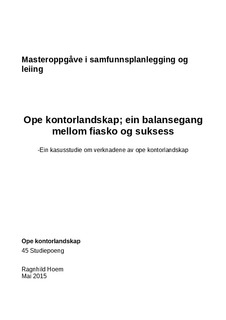| dc.contributor.author | Hoem, Ragnhild | |
| dc.date.accessioned | 2015-11-18T13:22:45Z | |
| dc.date.available | 2015-11-18T13:22:45Z | |
| dc.date.issued | 2015 | |
| dc.identifier.uri | http://hdl.handle.net/11250/2364543 | |
| dc.description.abstract | Summary
The main purpose of this study is to find out what effects the employees in an organisation can experience from open-plan offices, and to find explanations to why these effects occur. This is a time-relevant topic, due to the increasing amount of organisations choosing the office-type for their organisations. It is also important to obtain more knowledge about the theme, as open-plan offices are often criticised for having negative influence on noise, productivity and employee health. The study has a casuistic approach, and is based on two sections in on of the departments of the Norwegian Health Economics Administration (HELFO). The study is a qualitative cross-sectional survey, with a retrospective view. The study builds on eight individual interviews with employees and leaders in the two sections. The study shows that open-plan offices can have negative effects on concentration, productivity, unity, sick leave and noise, but that it is possible to affect this. Through a good process one can restrict or prevent such outcomes when introducing open-plan offices, and instead achieve, among other things, an improved sense of unity, and increased exchange of knowledge between the employees. The study shows that the explanation behind the different effects, is found in the various options one has taken in the process of introducing open-plan office. We can consider open-plan offices as a dependent variable, influenced by several independent variables, such as what starting point the organisation has, and what strategy the organisation uses to implement the change. By taking into account the different variables before starting the process of introducing open-plan office, one can also produce conscious positive effects. The intention for everyone introducing open-plan office, should be to be aware of what starting point one has, and what goals one wants to achieve, and then make conscious decisions in the process of achieving the goals. Open-plan offices is a topic still in a need of research. This study has shown clear causal contexts between effects and different stages of the process. These results should be investigated through larger studies. There is also a need for studies that consider work-assignments in open-plan offices, studies that examine whether openplan offices fit better in certain organisational types, and prospective studies that follow the process of introducing open-plan offices. | nb_NO |
| dc.description.abstract | Samandrag
Formålet med denne studien er å finne ut kva verknader dei tilsette i ein organisasjon kan oppleve av ope kontorlandskap, og å finne ei forklaring på kvifor desse verknadene oppstår. Dette er eit aktuelt tema, då stadig fleire vel ope kontorlandskap for sin organisasjon. Det er også eit tema det er viktig å få meir kunnskap om, ettersom kontorløysinga ofte vert kritisert for ha negativ innverknad på blant annastøyforhold, produktivitet og dei tilsette si helse. Oppgåva har ei kasuistisk tilnærming, og studien tek utgangspunkt i to seksjonar i ei av avdelingane til Helseøkonomiforvaltningen (HELFO). Studien er ei kvalitativ tverrsnittsundersøking, med eit retrospektivt syn. Studien byggjer på åtte individuelle intervju med tilsette og leiarar i dei to seksjonane. Denne studien viser at ope kontorlandskap kan vere negativt for konsentrasjon, produktivitet, samhald, sjukefråvær og støynivå, men at det er mogleg å påverke dette. Gjennom ein god prosess kan ein avgrense eller unngå slike utfall ved innføring av ope kontorlandskap, og i staden oppnå blant anna betre samhald og auka kunnskapsutveksling mellom dei tilsette. Studien syner at forklaringa bak dei ulike verknadene, er å finne i dei vala ein har teke undervegs i prosessen med å innføre kontorløysinga. Vi kan sjå ope kontorlandskap som ein avhengig variabel som vert påverka av fleire uavhengige variablar, som t.d. kva utgangspunkt ein har før innføringa, og kva strategi ein nyttar for å gjennomføre endringa. Ved å ta omsyn til dei ulike variablane før ein startar prosessen med å innføre ope kontorlandskap, kan ein også produsere bevisste positive verknader. Målet for alle som skal innføre ope kontorlandskap må difor vere å vere bevisst på kva utgangspunkt ein har, og kva mål ein ynskjer å oppnå, for så ta bevisste val i prosessen for å oppnå dei måla ein ynskjer. Det er framleis behov for ytterlegare forsking på ope kontorlandskap. Denne studien syner klare årsakssamanhengar mellom verknader og ulike moment ved prosessen. Desse resultata kan med fordel styrkast gjennom større studiar. Det er også behov for studiar som ser på arbeidsoppgåver i ope kontorlandskap, studiar som undersøker om ope kontorlandskap eignar seg betre i visse organisasjonstypar, og prospektive studiar som følgjer prosessen med å innføre ope kontorlandskap. | nb_NO |
| dc.language.iso | nno | nb_NO |
| dc.publisher | Høgskulen i Volda | nb_NO |
| dc.subject | opne kontorlandskap | nn_NO |
| dc.subject | kontorarbeidarar | nn_NO |
| dc.subject | arbeidsmiljø | nn_NO |
| dc.subject | organisasjonspsykologi | nn_NO |
| dc.subject | arbeidspsykologi | nn_NO |
| dc.subject | offentleg forvalting | nn_NO |
| dc.subject | Helseøkonomiforvaltningen - HELFO | nb_NO |
| dc.subject.ddc | 651.30683 | |
| dc.subject.ddc | 658.23 | |
| dc.subject.ddc | 331.7616513 | |
| dc.subject.ddc | 331.012 | |
| dc.subject.ddc | 158.7 | |
| dc.subject.ddc | arbeidsmiljø | |
| dc.title | Ope kontorlandskap. Ein balansegang mellom fiasko og suksess. Ein kasusstudie om verknadene av ope kontorlandskap | nb_NO |
| dc.type | Master thesis | nb_NO |
| dc.subject.nsi | VDP::Social science: 200::Psychology: 260::Social and occupational psychology: 263 | nb_NO |
| dc.subject.nsi | VDP::Social science: 200::Psychology: 260::Organizational psychology: 268 | nb_NO |
| dc.subject.nsi | VDP::Social science: 200::Political science and organizational theory: 240::Public and private administration: 242 | nb_NO |
| dc.subject.nsi | VDP::Social science: 200::Economics: 210::Business: 213 | nb_NO |
| dc.source.pagenumber | 128 s. | nb_NO |
